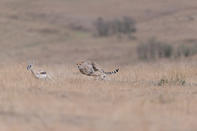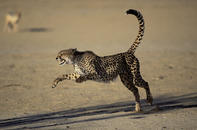The Need for Speed

Cheetah are predators specialized for speed. Clocking a record speed of 112 km/h, they are undoubtedly the fastest land mammals.
Generally, cheetah only accelerate up to between 75 - 100 km/h at a full sprint and this lasts only a few hundred meters before they tire. In order to be successful, cheetah must get close enough to their quarry before embarking on the final sprint and are thus accomplished stalkers.
They hunt in open areas making use of any available cover to stalk or they may simply walk directly towards the prey freezing immediately should the animal raise its head. Cheetah will try to get within 100 m of their target before chasing it and they typically choose animals isolated on the skirt of a herd.
Once the chase is underway, cheetah will pursue the animal for a short time only and its marvellous sprinting ability must enable it to gain on the prey almost immediately in order to trip it up with a paw and then secure a throat grip, thus depriving the prey of already depleted oxygen reserves, or else the cheetah will abandon the chase.
Once a kill is made, the cheetah is too exhausted to feed immediately and rests to catch its breath first. Prey is eaten where it falls or dragged to nearby shade if possible.
Speed Vs Defences

Because cheetah are so overspecialized for speed they are almost totally defenceless against larger predators like lion, leopard, hyena and even vultures. As a result, they are very susceptible to losing kills to larger predators.
After making a sprint to kill, cheetah are typically exhausted and can not begin to feed immediately. To avoid the attentions of largely nocturnal carnivores, cheetah hunt during the day (diurnal predators). However, all predators are opportunistic and should they become aware of a kill, they will scavenge regardless of the time of day.
Although cheetahs are relatively large in size, they generally do not attack large ungulates (hoofed animals) like wildebeest, zebra or buffalo. This is due to the fact that pulling these powerful animals down requires great strength which the cheetah lacks and in the process would risk injury to itself.
Coalitions of males may cooperate to pull down larger prey but usually, they target younger animals of these species.
By Megan Emmett